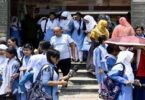Alisa Sheraz
Quaid-e-Azam said once addressing a group of students,”Without education it is complete darkness and with education it is light. Education is a matter of life and death for our nation. The world is moving so fast that if you do not educate yourselves you will be not only completely left behind but will be finished up”. The beloved Holy Prophet (PBUH) had encouraged his followers to go even to China in the pursuit of knowledge if it is needed.
Right at that time, it was quite difficult to have higher education smoothly so the quote itself shows the intensity of the subject matter.Muslims as the true followers of the glorious heritage of Islam should surely utilize all available opportunities.There is an extreme need to question yourself today if we respect the words of Quaid-e-Azam.
The father of our nation, the incredible personality who tried till his last breath to see the youth of Pakistan asan intellectual nation that couldn’t be whipped off.Is a piece of paper, which is known as degree has privilege in Pakistan or the quality of education is superior? Do our children just memorize the written stuff or they really learn something? Let’s have a look at the Education system of Pakistan. The education system in Pakistan is generally divided into six levels: preschool (for the age from 3 to 5 years), primary (grades one through five), middle (grades six through eight), high (grades nine and ten, leading to the Secondary School Certificate or SSC), intermediate (grades eleven and twelve, leading to a Higher Secondary School Certificate or HSSC), and university programs leading to undergraduate and graduate degrees.
The standard national system of education is mainly inspired by the English educational system. Pre-school education is designed for 3–5 years old and usually consists of three stages: Play Group, Nursery and Kindergarten (also called ‘KG’ or ‘Prep’). After pre-school education, students go through junior school from grades 1 to 5. This is followed by the middle school from grades 6 to 8. In middle school, single-sex education is usually preferred by the community, but co-education is also common in urban cities.
There are topmost Universities in Pakistan with high ranking but the qualified students still are notified of being timid and not confident to speak the English language well. Although their syllabus is throughout the English medium yet they are not able to speak English fluently without having reluctance. English has become the language of science and technology, there is no area of this world where English is not preferred. It’s crucial to learn the English language for a successful career, for your strong image or to have golden opportunities.
It wouldn’t be said wrong that if u can speak English well rather having no degree you will be still praised or will be influenced by other intellectuals in your surroundings.Despite all the attached data, Lotsa questions pop up in my mind and bother me a lot, if we examine or evaluate the education system from K.G to master level. A big fat question leaves a striking stroke on our minds.Is the level of Pakistan’s govt schools students is comparable to that of students in other countries? Do our teachers deliver the awareness to our children that must be established? Do our students have adequate credibility to persuade intellectuals even after reaching master’s level? Is the standard of education of children living in villages the same as that of children living in cities? Are the concepts of the subject matter is cleared in our government school or students are just taught what is written on a piece of paper? Does our govt need to have a strict check and balance on our institutions, teacher’s and students’ activities or let it be as it is going on? Our teachers must be good English speakers to make their students fluent in the English language or to make them confident to overcome their hesitation. If we will not provide the English atmosphere.






